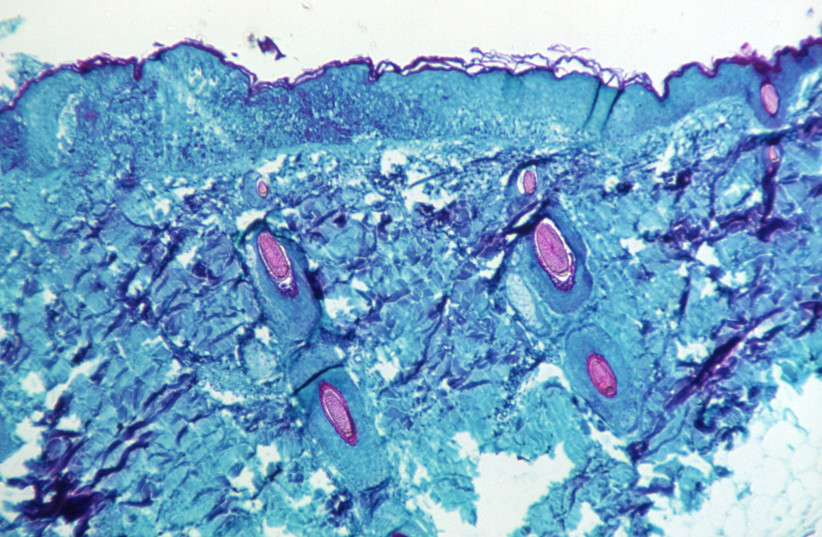The suspected monkeypox case first reported on Friday night has been confirmed through lab testing, Israel's Health Ministry reported on Saturday evening.
The case was detected in a man in his 30s who had recently returned from a trip in western Europe, according to the Tel Aviv Sourasky Medical Center - Ichilov, where he is quarantined and in mild condition.
An emergency meeting was called by the Israeli Health Ministry's Team of Epidemics Management on Saturday night after the discovery of the case the previous evening.
The team discussed available treatments for monkeypox and how its been spreading around the world. An announcement by the team pointed out that many patients appear to be gay men who were infected a parties in Western Europe, but stressed that the disease itself is not related to sexual preference or unique to homosexual men.
The Health Ministry is examining the supply of vaccines and relevant medications and is preparing to regulate the diagnosis as the number of infections in Israel increases. "At this stage, there is no concern of a pandemic of the same magnitude as COVID-19, but we must act in a focused and cautious manner," said Dr. Arnon Shahar, a member of the team.

In the meantime, the Health Ministry has asked that anyone who develops a fever and rash shortly after returning from abroad contacts a medical professional.
Monkeypox cases worldwide
The World Health Organization is working on further guidance for countries on how to mitigate the spread of monkeypox, amid concerns cases could spike further in the summer months, a senior adviser for the UN agency told Reuters.
The WHO's working theory based on the cases identified so far is that the outbreak is being driven by sexual contact, said David Heymann, chair of the WHO's Strategic and Technical Advisory Group on Infectious Hazards with Pandemic and Epidemic Potential. He led a meeting on the outbreak on Friday.
The outbreak in 11 countries where it is not endemic is highly unusual, according to scientists. More than 100 confirmed or suspected cases have been reported, most of them in Europe.
Heymann, a professor at the London School of Hygiene and Tropical Medicine, said experts were likely to give more guidance to countries in the coming days. Health officials in several countries have warned that cases could rise further at major summer gatherings and festivals.
Many of the current cases have been identified at sexual health clinics.
Early genomic sequencing of a handful of the cases in Europe has suggested a similarity with the strain that spread in a limited fashion in Britain, Israel and Singapore in 2018.
Heymann said it was "biologically plausible" that the virus had since been circulating outside of the countries where it is endemic, but had not led to major outbreaks as a result of COVID-19 lockdowns, social distancing and travel restrictions.
He stressed that the monkeypox outbreak did not resemble the early days of the COVID-19 pandemic because it does not transmit as easily. Those who suspect they may have been exposed or who are showing symptoms, including the typical bumpy rash and fever, should avoid close contact with others, he said.
"There are vaccines available, but the most important message is, you can protect yourself," he added.
What is monkeypox?
The Health Ministry's website describes monkeypox as a "viral illness that is characterized by fever, headaches, muscle pain and fatigue were up to three days later, a unique rash develops. Monkeypox belongs to the family of poxes which show up in a variety of types and is similar to chickenpox but with different rashes. The virus lasts for two to four weeks and usually goes away by itself without treatment."
Monkeypox is known to be transmitted mainly through airborne droplets but can also be transferred through contact with bodily fluids and objects that come in contact with bodily fluids like clothes and sheets.
